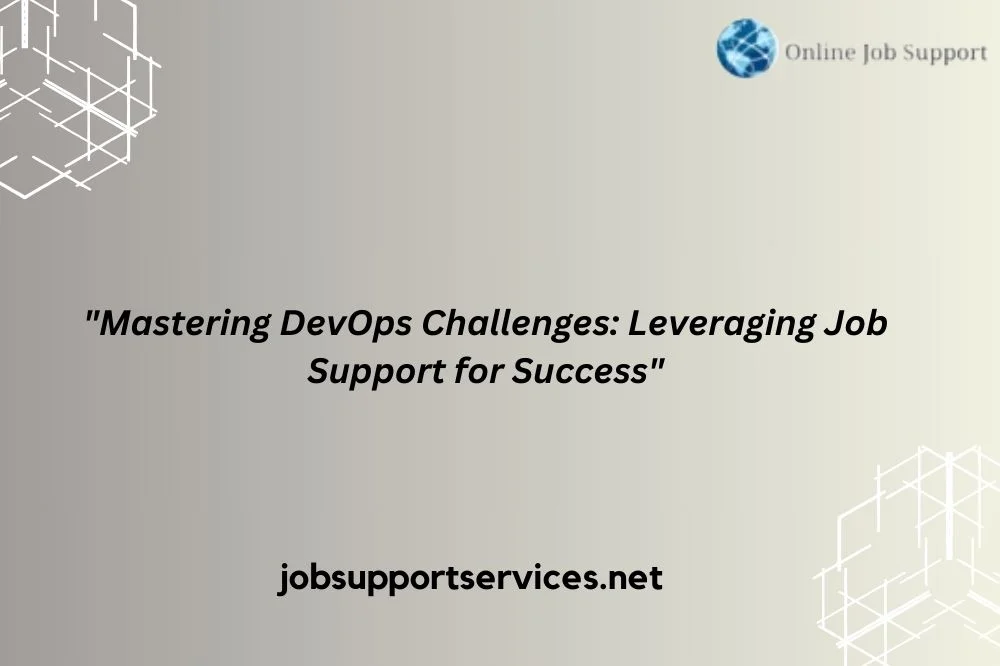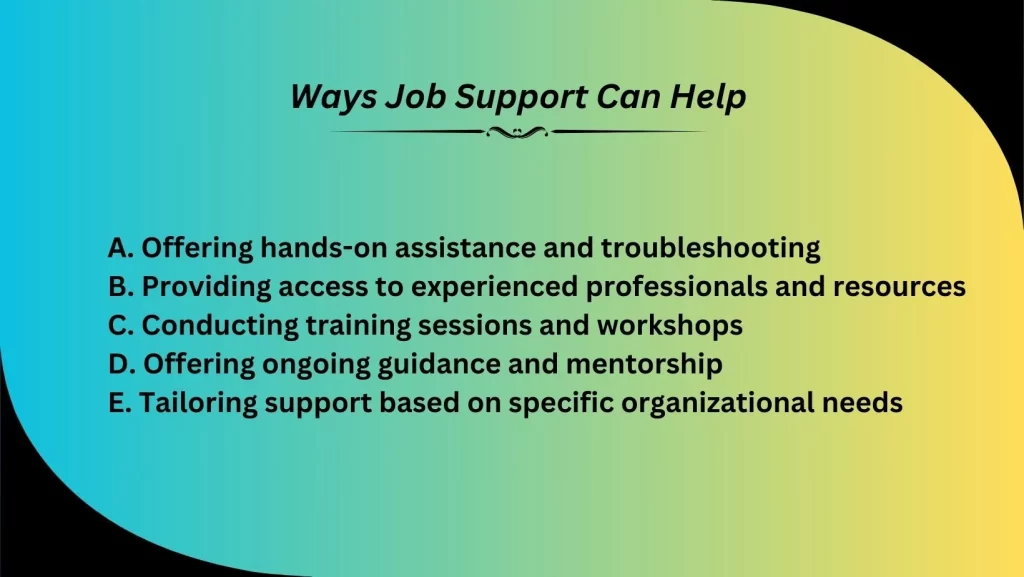Mastering DevOps Challenges: Leveraging Job Support for Success
Introduction
Definition of DevOps
DevOps is a methodology that combines software development (Dev) with IT operations (Ops), emphasizing collaboration, automation, and continuous integration/continuous delivery (CI/CD) to streamline the software development lifecycle.

Importance of DevOps in Modern Software Development
Speed: Enables faster delivery of software and updates.
Quality: Improves software quality through automated testing and continuous feedback.
Collaboration: Facilitates collaboration between development and operations teams and breaks down silos.
Innovation: Encourages innovation by fostering a culture of experimentation and iteration.
Challenges We Face When Implementing DevOps Practices
Cultural shift: Resistance to change in teams and organizational culture.
Tools and Automation: Implementing effective tools and automation strategies.
Skills Gaps: Bridging the skills gap between development and operations.
Measurement and Metrics: Defining and Measuring Success in DevOps Initiatives.
With its holistic approach to software development and deployment, DevOps addresses these challenges while significantly improving agility and efficiency in the modern software environment.
Feel free to expand on each point in your essay or presentation. If you need more details or specific information, let me know!
Challenges in DevOps implementation
Siled Organizational structure
Description: Traditional organizational structures often separate teams (such as development, operations, quality control), leading to communication gaps and hindering collaboration.
Impact: Slows feedback loops, inhibits knowledge sharing, and creates barriers to seamless software delivery.
Resistance to cultural change
Description: The cultural shifts necessary for DevOps—such as breaking down silos, embracing transparency, and fostering cross-functional collaboration—may face resistance.
Impact: Hinders the adoption of new practices, slows down change initiatives, and affects team morale and productivity.
Lack of standardized processes and tools
Description: Inconsistent tools, processes and methodologies across teams or departments.
Impact: Impedes automation, creates inefficiencies, and complicates collaborative efforts.
Comprehensive infrastructure management
Description: Handling diverse and complex infrastructure setups (on-premises, cloud, hybrid environments) presents challenges in maintaining consistency and reliability.
Impact: Increases the complexity of deployment, testing, and monitoring, which can lead to errors or downtime.
Continuous Integration and Continuous Deployment (CI/CD) Issues
Description: Challenges in setting up and maintaining effective CI/CD pipelines, including integration issues, testing bottlenecks, and deployment failures.
Impact: Slows delivery, affects software quality, and limits the ability to achieve continuous deployment goals.
Addressing these challenges involves a combination of technical solutions, cultural shifts, and process improvements to create an enabling environment for successful DevOps adoption.
The role of workforce support in overcoming DevOps challenges
Provision of specialized knowledge and expertise
Description: Job support offers access to individuals with specialized skills and experience in various DevOps domains.
Impact: Enables teams to solve complex problems, implement best practices, and effectively optimize processes.
Help with cultural transformation
Description: Labor support can facilitate cultural change by offering advice, fostering collaboration and fostering a DevOps mindset.
Impact: Helps eliminate clutter, improve communication and foster a culture of continuous improvement.
Guidelines for implementing standardized processes and tools
Description: Job support helps with the implementation of standardized processes and the selection of suitable tools for automation and collaboration.
Impact: Streamlines workflows, increases efficiency and promotes consistency across teams.
Support in infrastructure management and process automation
Description: Work support helps in managing complex infrastructure settings and implementing automation solutions.
Impact: Increases reliability, reduces manual errors, and accelerates deployment and testing processes.
Training and Mentoring for Successful CI/CD Implementation
Description: Job Support provides training and mentoring to teams to effectively set up and maintain CI/CD.
Impact: Improves understanding, enhances skill sets and supports a smoother CI/CD pipeline for fast and reliable software delivery.
Workforce support plays a key role in guiding teams through challenges and providing them with the knowledge, skills and hands-on assistance needed to successfully adopt DevOps practices and achieve organizational goals.
Would you like more details on any of these points or additional information?
Ways job support can help
Offer practical assistance and troubleshooting
Description: Task Support provides direct assistance in troubleshooting, debugging, and troubleshooting issues encountered during a DevOps implementation.
Impact: Facilitates rapid troubleshooting, minimizes downtime, and improves overall system reliability.

Providing Access to Experienced Professionals and Resources
Description: Job Support provides access to a group of experienced professionals, industry best practices and relevant resources.
Impact: Enables teams to leverage specialized knowledge, gain insight, and leverage proven strategies for effective DevOps practices.
Conducting training and workshops
Description: Job support offers training and workshops on various DevOps tools, methodologies and practices.
Impact: Improves skill sets, supports learning and enables teams to effectively apply new techniques and technologies.
Offer ongoing guidance and mentorship
Description: Job support provides ongoing guidance and mentoring to meet challenges and support continuous improvement.
Impact: Fosters a culture of learning, fosters innovation, and ensures continuous progress in DevOps adoption.
Support customization based on specific organizational needs
Description: Job support tailors assistance to address an organization’s unique requirements and challenges.
Impact: Provides targeted solutions, maximizes support efficiency, and aligns DevOps initiatives with organizational goals.
By offering different forms of support, work support becomes a critical asset that enables teams to overcome obstacles, acquire new skills, and successfully implement DevOps practices tailored to their organizational context.
Case studies or examples
Stories of successful implementation with work support
Company X:
Scenario: Company X struggled with a fragmented development and deployment process, resulting in late releases and poor quality.
Interventions to support work: A team of DevOps experts provided practical advice, led tailored workshops and offered ongoing mentorship.
Result: Supported by the work, Company X successfully adopted CI/CD pipelines, automated testing, and improved collaboration. This resulted in a 40% reduction in release cycles and a 25% increase in overall product quality.
Organization Y:
Scenario: Organization Y faced resistance to cultural change, which hampered their DevOps transformation efforts.
Interventions to support work: Experienced mentors facilitated cultural workshops, emphasizing the importance of collaboration and continuous improvement.
Result: Work support helped to strengthen a culture of trust and cooperation and break down silos. This resulted in a 30% increase in deployment frequency and a more cohesive and efficient team.
How Work Support Solved Specific DevOps Challenges in Different Organizations
Challenge: Siled Organizational structure:
Solution: Work support supported collaboration between teams through regular meetings, shared tools and knowledge sharing sessions.
The result: Improved communication, faster problem resolution, and a more unified approach to software development and operations.
Challenge: Lack of standardized processes and tools:
Solution: Work support provided advice on the selection and implementation of standardized tools and the implementation of effective processes.
The result: Increased efficiency, reduced errors, and better consistency in development, leading to a smoother workflow.
Challenge: Managing a complex infrastructure:
Solution: Work support offered expertise in managing various infrastructures and implementing automation solutions.
The result: Improved scalability, reduced downtime, and optimized resource utilization across multiple environments.
These examples highlight how work support plays a key role in solving specific problems faced by organizations, leading to successful DevOps implementation and better results.
Conclusion
Summary of the importance of overcoming DevOps challenges
Successful DevOps implementation is paramount in today’s rapidly evolving software environment. Overcoming DevOps challenges ensures:
Faster delivery of high-quality software.
Improved collaboration and innovation.
Adaptability to changing market requirements.
Emphasizing the importance of supporting work to achieve a successful DevOps implementation
Work Support serves as a catalyst for navigating and overcoming DevOps obstacles:
Providing expertise and practical help.
Supporting cultural transformation and leading process standardization.
Offer ongoing mentoring and training to improve skills.
Encouraging organizations to use workforce support for DevOps success
Incorporating job support into DevOps initiatives is not only beneficial; it is essential. Organizations should:
Realize the value of support work in accelerating DevOps maturity.
Invest in resources that offer advice, expertise and tailored solutions.
Cultivate a culture of continuous learning and improvement by integrating work support into their DevOps strategies.
In conclusion, the path to successful DevOps adoption requires overcoming challenges, and job support appears to be a key ally in this effort. Organizations that use and utilize workforce support are better prepared to thrive in the ever-changing landscape of modern software development.
